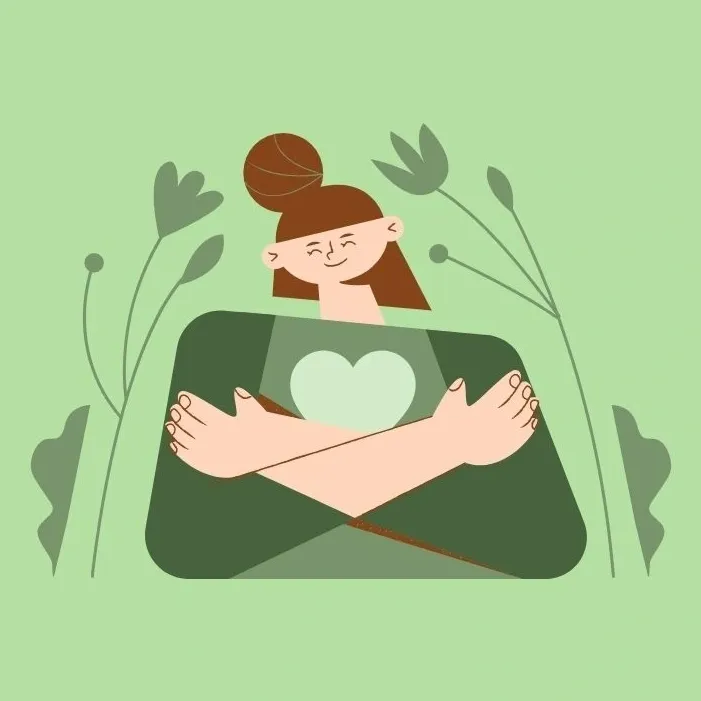
When self love is mentioned you might first think of pamper days, meditation or spring cleaning but it is in fact a whole lot more than that. Self love really means a consideration of one’s happiness and worth, and purposeful actions that support individual growth (Borenstein, 2022), despite also acknowledging that we each have our own flaws and imperfections. Choosing to engage in self love has proven benefits to health and wellbeing and for our relationships with others as it allows us to show up with strength, empathy and boundaries. Self love is also a lot to do with the attitude we take towards ourselves – just like we would with someone we care about, it means being kind, patient and understanding with ourselves as we navigate this crazy world. Figuring out what self love means to you is an important first step, because it’s a different experience for everyone.
Self love or self compassion (often used interchangeably) is often dismissed as selfish or cliche – or in some cases something that we are not deserved of. Loving ourselves can also feel like a lot of pressure (especially if you don’t really feel love towards yourself). You’ve probably heard the saying “you can’t love someone else until you love yourself” – a saying which we think is mostly unhelpful, but does offer a tiny bit of truth. When we can learn how to appreciate ourselves, our capacity to receive love from others often increases, and we are better able to set appropriate boundaries that value our worth. To help you out with this, take some time to reflect on the tips we’ve put together below, and maybe give one (or two) of them a go to see what works for you.
Acknowledge that beauty cannot be defined
Although it may truly feel like it, your value does not come from your appearance or the way your body looks. We live in a world where the media constantly promotes specific beauty ideals that we should be adhering to, which puts a lot of pressure on us to morph our appearances to look a certain way (or else be shunned by society). This can also lead us to compare our worth to others and start feeling pretty down about ourselves. Choosing to show up as yourself, regardless of beauty standards and ideals, is a powerful act of self-love, as it demonstrates that you accept and love yourself as you are, in your own body, wearing what you want to wear. This means acknowledging that the content you choose to engage with on media platforms can often be unhelpful and warp your idea of beauty – and that you may need to detox from some of this to start taking a new perspective on yourself.
Learn how to forgive yourself
Everybody makes mistakes sometimes – we are humans, not robots. But as we get older, the pressure to have it all together can seem to grow, especially as we take on more responsibilities. We’re sure that you’ve probably been pretty hard on yourself when you’ve stuffed something up (just like so many of us have) – but how has this really helped you in that situation? In fact, times when we do make mistakes, fail or mess up are when we need the most support and compassion from ourselves – and it’s unlikely that you consider it fair to beat on someone while they’re down so why are you doing it to yourself? Being able to make mistakes, reflect on them and learn from them is an important part of accepting yourself (and that you’re not perfect – because nobody is). When you next notice that you’re reprimanding yourself for a mistake, try asking yourself what you really need in this moment and offering that instead – and see what feels different with an attitude of self-compassion and forgiveness.
Surround yourself with people who bring out the best in you
Who needs toxic energy? Certainly not us. But sometimes we can fall into the trap of spending time with people purely because it would be too hard to set boundaries or find new people – even if these people bring toxic energy into our lives. Although self-love is primarily focused on the self (well duh..), we do not exist on this earth by ourselves. We often learn how to love ourselves by modelling the people around us, and how much we love can depend on how much love we have received in the first place. So reflecting on the people we surround ourselves with is definitely important. If you take a moment to think about the people you regularly spend time with, can you honestly say these people encourage you, inspire you, and truly care about your wellbeing? If you answered no to any of these, it might be time to consider how this energy might be affecting you, and start finding new people who do bring out the best in you. It may also be worth considering some of the patterns you notice in your relationships, to see if you might need to change how you engage and interact with the people in your life.
Practice putting yourself first sometimes
We just know that you likely have a tendency to put everyone in your life ahead of yourself – you may even find joy or purpose in doing so because helping others feels good. But making time for yourself is an important part of self-love and necessary for maintaining positive health and wellbeing. This includes making room for emotional states, allowing yourself to feel what you need to feel, and not judging yourself for feeling a certain way – and remember, just because you try to avoid an emotion, doesn’t mean you won’t feel it (or at least at some point). Often putting ourselves first can feel selfish, and you might wonder what you’ve done to deserve this. But (and it might surprise you) you can’t earn self-love – and there’s nothing intrinsically wrong with putting yourself first sometimes. In fact, looking after yourself helps you to help others better, as it allows you to show up with greater energy, an open mind and strength. Remember that “you can’t pour from an empty cup” (as you’ve probably heard a thousand times before) – so putting yourself first is not only an act of self-love but also a way to ensure you can continue helping all those you care about.
Do more of what makes you happy
Seems simple right? Just do the things that make you feel good. But this means not only saying yes to those things that fill us with joy, but also saying no to the things that do the absolute opposite – which can be difficult to recognise sometimes. Being able to acknowledge the difference between self-love and self-sabotage should help with this – are you doing this thing purposefully, to feel happy, or are you doing it to avoid something or someone? To get a head start on this, think of the things that truly bring you a sense of happiness, that make you smile from ear to ear and make your insides feel warm and fuzzy. These are the things you want to purposefully engage in more often – which may mean reorganising a busy schedule, prioritising certain activities over others, and ultimately saying no to the things that do not serve a purpose or do not make you feel good.
References
Borenstein, J. (2022). Self-Love and What It Means. Retrieved 16 February 2022, from https://www.bbrfoundation.org/blog/self-love-and-what-it-means









